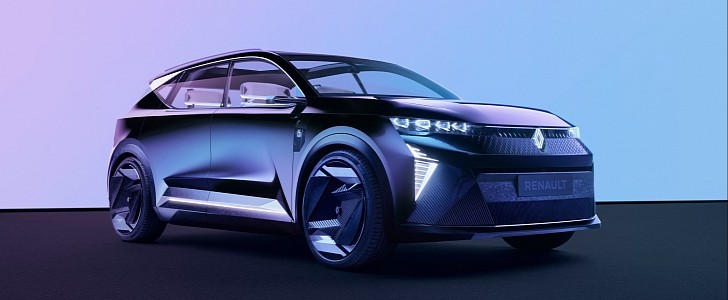Although Renault has just presented its Scenic Vision concept car to the world, which features an electric and hydrogen powertrain, the company’s CEO is not convinced hydrogen-powered vehicles are the way to go at the moment in the race to zero-emissions.
The French carmaker unveiled the Scenic Vision concept at the ChangeNOW summit in Paris. The hydrogen fuel cell-powered sports utility vehicle prototype is part of the company’s efforts towards cleaner driving, but it would only become commercially available in 2030-2032.
However, an electric model will be marketed starting in 2024, and it’s a stamp of the company’s commitment to sustainability as no less than 70% of the materials used in creating the vehicle are recycled, and the final product will be more than 95% recyclable, including the battery.
Speaking of the battery, this will be twice as light, reducing carbon footprint by 75% compared to conventional electric vehicles. Moreover, the H2-EV-powered SUV will be equipped with a 16kW fuel cell that will extend the vehicle’s range to 800km without the need to recharge.
Just after introducing the prototype on Thursday, Renault’s CEO Luca de Meo is citing as saying that “Hydrogen has a role. We will have a commercial vehicle on sale using this technology this year, and work with business partners to introduce it. But on cars? Honestly, who knows.”
“The challenge is making costs acceptable for customers and installing a charging network. There are still debates on making the electric charging network good enough - and in comparison to a hydrogen re-fuelling network, that is simple.”
He is referring to the hydrogen-powered Renault Master vans that have been built in collaboration with Plug Power under the HYVIA nameplate and which are scheduled to hit dealerships this summer.
So H2-tech technology on a passenger car remains just a vision for the moment. We’ll just have to wait and see.
However, an electric model will be marketed starting in 2024, and it’s a stamp of the company’s commitment to sustainability as no less than 70% of the materials used in creating the vehicle are recycled, and the final product will be more than 95% recyclable, including the battery.
Speaking of the battery, this will be twice as light, reducing carbon footprint by 75% compared to conventional electric vehicles. Moreover, the H2-EV-powered SUV will be equipped with a 16kW fuel cell that will extend the vehicle’s range to 800km without the need to recharge.
Just after introducing the prototype on Thursday, Renault’s CEO Luca de Meo is citing as saying that “Hydrogen has a role. We will have a commercial vehicle on sale using this technology this year, and work with business partners to introduce it. But on cars? Honestly, who knows.”
“The challenge is making costs acceptable for customers and installing a charging network. There are still debates on making the electric charging network good enough - and in comparison to a hydrogen re-fuelling network, that is simple.”
He is referring to the hydrogen-powered Renault Master vans that have been built in collaboration with Plug Power under the HYVIA nameplate and which are scheduled to hit dealerships this summer.
So H2-tech technology on a passenger car remains just a vision for the moment. We’ll just have to wait and see.













